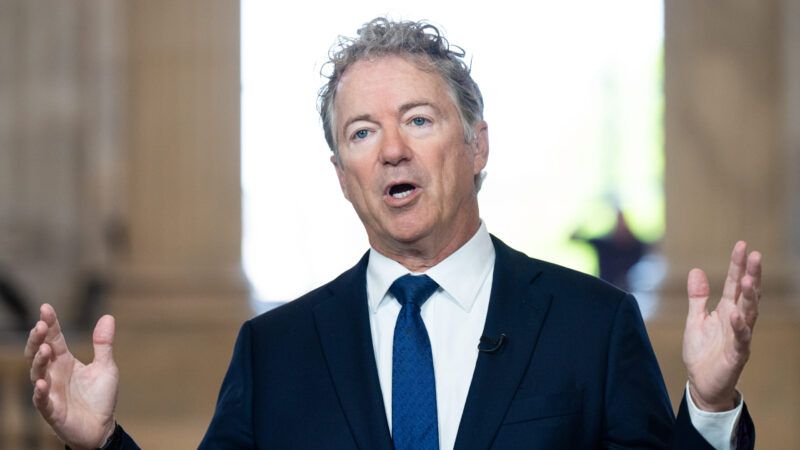Senate's Tax Bill Will Add $270 Billion to the Deficit Next Year, Despite Gimmicks
The House-passed version of the One Big Beautiful Bill Act was fiscally irresponsible. The Senate has made the bill worse.

In deciding whether to vote for the tax and spending package now sitting before the Senate, Sen. Rand Paul (R–Ky.) says he's been asking himself a simple question: Does the bill increase the federal deficit next year?
"The answer, without question, is that this bill will grow the deficit," Paul told his fellow senators on Sunday afternoon.
Most budget projections in Washington operate on a 10-year window, which is useful for long-term policymaking—not all fiscal consequences of a new law are apparent in the first year after it is passed. Unfortunately, as Paul points out, the 10-year budget window also creates opportunities for lawmakers to load up bills like this one with gimmicks designed to hide the true cost.
Over 10 years, the Senate version of the "One Big Beautiful Bill" Act will reduce the deficit by $521 billion, according to a Congressional Budget Office (CBO) analysis released Sunday. Those budget savings are the result of about $1.3 trillion in spending reductions—almost all of which would occur in the last five years of that 10-year window.
Whether those spending cuts actually happen will depend on future lawmakers sticking to the plan. But the existence of that plan can be used to offset tax cuts approved by lawmakers today.
And that's only the second biggest gimmick in the bill. The largest gimmick by far is the decision to have the CBO score the legislation based on the faulty assumption that the 2017 tax cuts would not expire this year. That so-called "current policy" baseline hides the $3.9 trillion budgetary hit that would otherwise have to be offset to make the bill revenue-neutral.
It is roughly the equivalent of saying that your rent payment will be the same next month, so therefore does not cost anything—and then using that logic as a justification to spend your entire monthly budget on other purchases.
On the Senate floor on Sunday, Paul noted that looking just one year ahead helps to unravel the web of gimmicks built into the bill. Even under the "current policy" baseline, a vote for the bill would be a vote to increase the deficit.
"Even using the math—even using the formulas—that the supporters of the bill like, the deficit will still grow by $270 billion next year," Paul said. "That's just not good if you profess to be fiscally conservative."
The Senate's version of the bill is also significantly less fiscally conservative than the House-passed version, which would add an estimated $2.8 trillion to the deficit over a decade, once economic effects are taken into account.
Things could still change (a final vote on the Senate bill is expected Monday or Tuesday), but the Senate's version makes the controversial State and Local Tax (SALT) deduction more lucrative than the House version—effectively giving a bigger tax break to wealthy Americans who choose to live in high-tax states. It also accelerates the insolvency of Medicare and Social Security by cutting taxes on Social Security payments. And it removes some spending cuts aimed at the food stamps program that were meant to nudge states to pay a portion of its exploding costs.
All in all, the Senate version likely violates the rules that Congress previously agreed upon to guide the reconciliation process for the tax bill. Under that agreement, Congress is allowed to authorize no more than $2.5 trillion of new borrowing (to cover the cost of the tax cuts) above whatever spending cuts are contained in the bill. The House version, for example, had $1.6 trillion in spending cuts and an estimated $3.8 trillion in tax cuts. That's a difference of $2.2 trillion, so it complied with the rules.
The Senate bill, meanwhile, contains $4.5 trillion of tax cuts and just $1.4 trillion in spending cuts, according to an estimate by the Committee for a Responsible Federal Budget. Separately, the Economic Innovation Policy Center estimates that the bill is $465 billion short of meeting the reconciliation framework.
In short, the Senate bill is more fiscally irresponsible than the House bill, which was itself wildly irresponsible. It's even more fiscally irresponsible than a framework that authorized trillions in new borrowing to begin with. It's a bad bill built atop a questionable fiscal scaffolding and littered with gimmicks that will allow its supporters to falsely claim they are cutting the deficit when they are, in fact, greatly increasing it.
All of that analysis can be a bit confusing and overwhelming. That's when the merits of Paul's approach shine most clearly.
What does the One Big Beautiful Bill do next year? It increases the deficit. The specifics should not matter as much as that simple fact.


Show Comments (102)